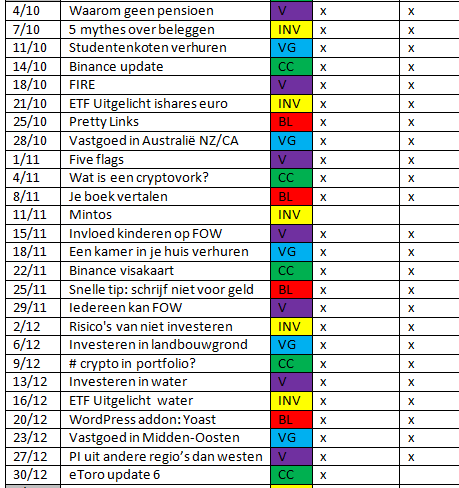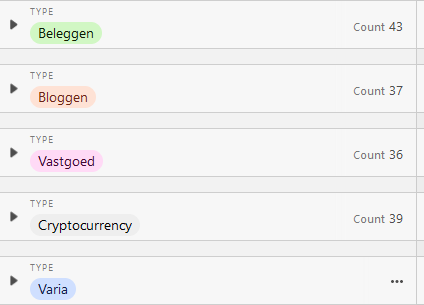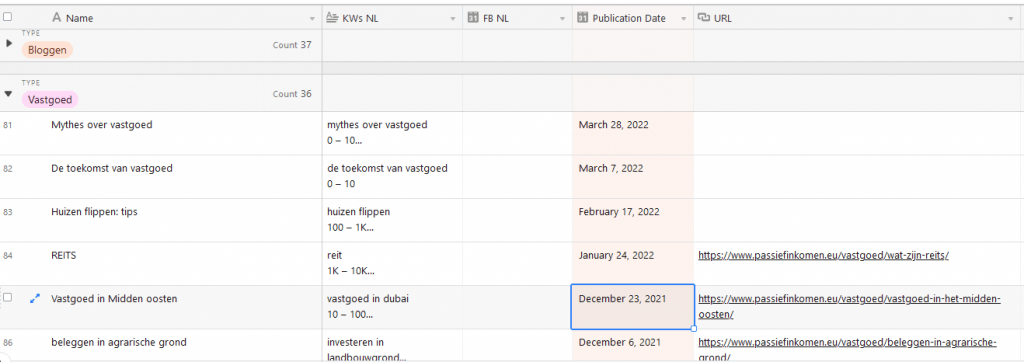Snelle tip #4: Plan je artikels op voorhand
Laatste update: 27 maart 2022
Als je een blog hebt, is het belangrijk dat je een schema opstelt voor wanneer je precies je artikels gaat publiceren, en dat je je daar dan ook aan houdt.
Zo kan je immers bij je publiek een gevoel van vertrouwen opwekken, ze weten precies wanneer ze van jou een nieuw artikel kunnen verwachten.
Als je gewoon willekeurig artikels begint te publiceren, zal je vaak in situaties komen waar je er 2-3 online zet de ene week, en de volgende week geen enkel.
Dat is ook niet goed voor Google, want op het vlak van SEO is het goed om consistent en regelmatig nieuwe artikelen live te zetten.
Mijn persoonlijk schema bestaat uit elke week 2 artikels te publiceren, eentje op maandag en eentje op donderdag.
Dat lukt me doorgaans vrij goed, en in het anderhalf jaar dat ik nu bezig ben met deze blog heb ik dat vrij consistent kunnen doen.
Hoe kan je je artikels plannen?
Mijn persoonlijke aanpak is mijn artikelen voor deze site per kwartaal te plannen. Ik leg dus vast voor 3 maanden welke artikelen ik ga schrijven, en wanneer die gepubliceerd zullen worden.
Hiervoor gebruik ik een tabel in een Word-documentje:

Zoals je kunt zien gebruik ik kleurcodes voor de verschillende categorieën op de site, zoals Bloggen, Vastgoed en Cryptocurrency.
Ik spreid die een beetje, zodat er bijvoorbeeld geen 2 Vastgoed-artikelen na elkaar komen.
Zodra dit is opgesteld en ik de onderwerpen van de artikels heb vastgelegd, zet ik deze over in Airtable, dat ik gebruik als database en planner voor mijn artikelen.
Deze gratis software heb ik eerder al besproken, en kan ik je dan ook van harte aanraden.
Dit is het algemene overzicht van alle artikelen van deze website:

Dit is natuurlijk de ingeklapte versie, en als we bijvoorbeeld bij vastgoed kijken:

Zoals je kunt zien heb ik hier wat informatie staan, voornamelijk dan de sleutelwoorden, de URL, en vooral de publicatiedatum.
En dat is het!
Ik weet dus perfect op voorhand (meestal meerdere maanden) welke artikelen op welke dag zullen worden gepubliceerd.
Het is hierbij natuurlijk ook van belang dat je goed op voorhand schrijft, dat je altijd een voorsprong hebt.
Dit artikel is bijvoorbeeld geschreven op 28 december 2021, maar zal pas op 3 februari worden gepubliceerd.
Zo heb ik altijd een ruime marge, en als ik eens een paar weken geen zin heb om te schrijven, kan ik gerust een vakantie nemen, en mijn blog blijft gewoon lopen en de artikels worden automatisch gepubliceerd.
Hopelijk had je hier iets aan, want als je een beetje zoals mij bent, is het opstellen van een duidelijke structuur voor je blog van het uiterste belang om er zeker van te zijn dat je een goed schema kunt aanhouden.
De vorige tips die ik je heb gegeven voor je blog kan je hier nog eens nalezen:



